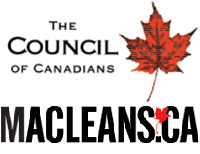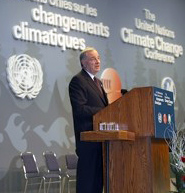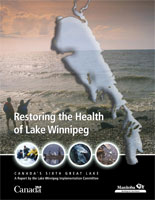
News |
- Santa May Need Water Wings
- World Moves Forward in Montreal
- To Sell or Not to Sell - Canada's Water
- Report Tells Oil Sands Story
- Hydro Dams Fight Climate Change?
- Paul Martin Issues Global Climate Change Challenge
- Thousands March, Urge US to Join Kyoto
- Largest Marine Conservation Area - Lake Superior
- Court Says Feds Side-stepped Treaty
- Reports Focus on Manitoba's Water
- Gas Pipeline Subsidies Raise Questions
- Federal Court Rejects Power Line
| Santa May Need Water Wings | 16 December 05 |
 Santa Claus may have to swap his sleigh for water wings sooner than expected as global warming melts his Arctic home, environmental group WWF said in a recent study. Santa Claus may have to swap his sleigh for water wings sooner than expected as global warming melts his Arctic home, environmental group WWF said in a recent study.A new study for the WWF predicts that the earth could warm by two degrees centigrade above pre-industrial levels as early as 2026 - and by triple that amount in the Arctic. "This... could result in Santa's home changing forever," said the report by Mark New of Oxford University. And Rudolph and his fellow reindeer are not the only creatures under threat - polar bears, ice-dwelling seals and several forms of Arctic vegetation are also at risk. "We are already seeing signs of significant change in the Arctic with mountain glaciers retreating, snow cover disappearing, the Greenland ice sheet thinning and Arctic sea ice cover declining," said WWF climate campaigner Andrew Lee. "All these changes tell us there is no time to lose -- we need to take drastic action now to combat climate change." View the full December 16, 2005 PlanetArk article Source: PlanetArk/Reuters |
|
| World Moves Forward in Montreal | 15 December 05 |
 "We will reconcile humankind with its planet," declared Canada's Environment Minister and COP/MOP President Stephane Dion at the December 10 conclusion of the UN climate conference in Montreal. The conference yielded the Montreal Action Plan, which Dion said, creates a road map to move forward on Kyoto implementation, and initiates discussion on post-2012 emission reduction commitments. "We will reconcile humankind with its planet," declared Canada's Environment Minister and COP/MOP President Stephane Dion at the December 10 conclusion of the UN climate conference in Montreal. The conference yielded the Montreal Action Plan, which Dion said, creates a road map to move forward on Kyoto implementation, and initiates discussion on post-2012 emission reduction commitments. The event was the largest climate conference since Kyoto was adopted in 1997. Among the nearly 10,000 delegates were over 500 accredited observers from Climate Action Network International member organizations. Key decisions made outline the path to future international action on climate change:
View the December 13, 2005 New York Times editorial View the December 13, 2005 Guardian article View the Independent Online Edition article (DOC) View the Climate Action Network ECO newsletters from Montreal Visit the United Nations Framework Convention on Climate Change Montreal 2005 web site View previous Manitoba Wildlands news items: December 6, 2005 news item & December 8, 2005 news item Sources: Government of Canada, Climate Action Network - Photo: Cassie Doyle, Assistant Deputy Minister, Environment Canada |
|
| To Sell or Not to Sell - Canada's Water | 12 December 05 |
 MacLeans Magazine featured an article November 28, 2005 that discussed reasons why Canada should consider selling its water. They also conducted a poll and created a readers forum on the subject. Overwhelmingly, those who participated in the poll did not support the commodification of Canada's water. MacLeans Magazine featured an article November 28, 2005 that discussed reasons why Canada should consider selling its water. They also conducted a poll and created a readers forum on the subject. Overwhelmingly, those who participated in the poll did not support the commodification of Canada's water. The MacLeans article pointed out the growing global shortage of freshwater resources, our southern neighbor's growing water crises, and Canadians' so-called wastefulness of this precious resource as factors to consider in the debate. Water 'sharing' (selling) as a humanitarian action, the damage to Canadians' collective image if we refuse to share and the huge economic opportunities associated with potential water sales were also raised in support of the argument to sell water. The Council of Canadians has responded to this article with an analysis of the MacLeans article. Susan Howatt, the Council of Canadians' (C of C) National Water Campaigner outlines five ways in which the MacLeans article mistakenly addresses Canada-US water concerns. Of primary importance is the fact that MacLeans does not address the risks associated with commodifying a public good. View the November 24, 2005 MacLeans Magazine article: America is Thirsty View the Council of Canadians analysis of the MacLeans water article View the MacLeans Canada Switchboard reader forum for this article Sources: Macleans Magazine, Council of Canadians |
|
| Report Tells Oil Sands Story | 12 December 05 |
 The Pembina Institute report, Oil Sands Fever: The Environmental Implications of Canada's Oil Sands Rush, tells the story of Canada's rapid development of the oil sands.
The rush to develop the oil sands and feed the demand for transportation fuels is not unlike the gold rush fever of the 19th century. The Pembina Institute report, Oil Sands Fever: The Environmental Implications of Canada's Oil Sands Rush, tells the story of Canada's rapid development of the oil sands.
The rush to develop the oil sands and feed the demand for transportation fuels is not unlike the gold rush fever of the 19th century."Such development comes at a great cost to the boreal forest, the water and the air," says Chris Severson-Baker, a co-author of the report. "We need strong environmental management in place to ensure that the development of this non-renewable resource does not leave a legacy of environmental degradation." The report sets out some of the Pembina Institute's key recommendations to move Canada towards more responsible development and use of the oil sands while ensuring that the global climate and regional environment are protected. View the Pembina Institute report Oil Sands Fever: The Environmental Implications of Canada's Oil Sands Rush View the Pembina Institute slideshow and video Source: Pembina Institute |
|
| Hydro Dams Fight Climate Change? | 08 December 05 |
 A Coalition of International and Canadian environmental organizations are demanding that governments and hydro utilities not destroy the environment in order to fight climate change. The environmental organizations point out that damming rivers has major environmental impacts, including on communities. The Coalition stresses that the new hydroelectric dams not be part of any greenhouse gases reduction plan. A Coalition of International and Canadian environmental organizations are demanding that governments and hydro utilities not destroy the environment in order to fight climate change. The environmental organizations point out that damming rivers has major environmental impacts, including on communities. The Coalition stresses that the new hydroelectric dams not be part of any greenhouse gases reduction plan.The International Rivers Network also shares the Coalition's position regarding the myth of 'clean' hydroelectricity. Patrick McCully, Executive Director of the International Rivers Network, commented, "Canada should not destroy its rivers for electricity or for dollars from exporting electricity to the US. Both countries have massive potential for reducing electricity use through improving efficiency and for replacing dirty coal plants with clean renewables such as wind and sustainable biomass." In Quebec, Manitoba and Newfoundland and Labrador, the increasing threat of new small and big hydroelectric projects will result in damage to river ecosystems. The James Bay (Rupert River), Hudson Bay (Nelson River) and Labrador (Churchill River) regions in Canada's North, some of the most important ecosystems in North America, are threatened by massive hydroelectric projects. No studies of combined effects from existing and intended dams have been done. View the December 8, 2005 environmental Coalition press release (PDF) French Version (PDF) Visit the International Rivers Network web site Visit the Rivers Foundation web site Visit the Sierra Club of Canada web site Source: Manitoba Wildlands |
|
| Paul Martin Issues Global Climate Change Challenge | 08 December 05 |
 Prime Minister Paul Martin opened the joint high-level segment of the UN conference on climate change in Montreal on December 7, 2005 with a clear call for strong action on climate change under the Kyoto Protocol, post 2012. Canada is host to the Conference of the Parties 11, first Meeting of the Parties under the Kyoto Protocol. Prime Minister Paul Martin opened the joint high-level segment of the UN conference on climate change in Montreal on December 7, 2005 with a clear call for strong action on climate change under the Kyoto Protocol, post 2012. Canada is host to the Conference of the Parties 11, first Meeting of the Parties under the Kyoto Protocol.The Prime Minister was clear about the realities of climate change and the responsibilities we all share. "We no longer need to ask people to imagine its effects, for now we see them. Here in Canada, our Far North has become an incubator for the altered world of tomorrow." "Climate Change is a global challenge that demands a global response, yet there are nations that resist, voices that attempt to diminish the urgency or dismiss the science - or declare, either in word or in indifference, that this is not our problem to solve. Well, it is our problem to solve. We are in this together." The plenary room was full; close to 8000 delegates and NGO representatives responded to the Canadian PM's address with a standing ovation - evidence of broad support for the message that climate change is perhaps the most important issue facing us today, and that inaction is not an option. The 2005 UNFCCC gathering is the largest COP (Conference of the Parties) to date; approximately 10,000 participants are registered, almost half of which are NGO representatives. Close to 500 representatives from Climate Action Network International member organizations are at the conference. View Prime Minister Paul Martin's speech at the opening of the Joint High Level Segment of the 2005 UN Conference on Climate Change View Environment Minister and President of the COP, Stephane Dion's remarks at the opening of the Joint High Level Segment of the 2005 UN Conference on Climate Change View the December 8, 2005 ECO article on the Prime Minister's address (PDF) View coverage of the Climate Change negotiations from the Canadian Press Sources: Manitoba Wildlands, Government of Canada |
|
| Thousands March, Urge US to Join Kyoto | 06 December 05 |
 Thousands of hardy global citizens gathered Saturday December 3, 2005 in the streets of Montreal, Canada, and in 30 other cities around the world. They came out to encourage government leaders to agree to deep emissions reductions for the next Kyoto period. Thousands of hardy global citizens gathered Saturday December 3, 2005 in the streets of Montreal, Canada, and in 30 other cities around the world. They came out to encourage government leaders to agree to deep emissions reductions for the next Kyoto period.Organizers of the march estimate the crowd at 40,000. Montreal police confirmed a crowd of at least 35,000. Polar bears, painted faces, puppets, drumming, singing, mock sections of the Mackenzie pipeline, and a host of placards and banners were all part of the march. Families with babes in strollers walked alongside youth and elders; raging grannies and Sierra Club youth sang ballads. Sierra Club of Canada Executive Director Elizabeth May received roaring approval from the crowd. "We will move the world ahead. We will not wait for George W. Bush... Together we can save the climate. Together we will stop fossil fuels from destroying our future." Expressions of disapproval for the US administration position (US has not joined the Kyoto Protocol) were accompanied by messages that the door is open for the US to join the global effort to address climate change. Stephane Dion, President of the COP/MOP and Canada's Environment Minister, will hopefully move the COP/MOP process further to include more developing country concerns, and concrete goals for the next Kyoto Protocol phase. View the December 3, 2005 coverage from CBC View the December 3, 2005 Reuters article in the New York Times View the December 4, 2005 Associated Press article in the New York Times View updates from the UN Climate Change meetings on Climate Network Canada's website Sources: Manitoba Wildlands, CBC, Reuters |
|
| Largest Marine Conservation Area - Lake Superior | 05 December 05 |
 Canada and Ontario have taken an important step toward the establishment of a national marine conservation area (NMCA) in Lake Superior, by signing an agreement in principle on the future transfer of the lakebed and lands within the proposed NMCA from Ontario to Canada. WWF Canada applauded the move. Canada and Ontario have taken an important step toward the establishment of a national marine conservation area (NMCA) in Lake Superior, by signing an agreement in principle on the future transfer of the lakebed and lands within the proposed NMCA from Ontario to Canada. WWF Canada applauded the move.Both governments will now work toward a final agreement to establish the NMCA in Lake Superior, the world's largest freshwater lake by surface area. The lake holds close to 10% of the global supply of surface fresh water and over half of the water in the Great Lakes. The NMCA in Lake Superior will become Canada's largest national marine conservation area, and the first to be established under the Canada National Marine Conservation Areas Act, which became law June 2002. "This long stretch of coastline, coastal islands, wetlands and open water is one of the last remaining portions of the Great Lakes that is still healthy and relatively intact," said Josh Laughren, Marine Conservation Director, WWF-Canada. "It is an outstanding representation of the physical and biological character of the entire lake and is home to a wide variety of wildlife, including bald eagles, peregrine falcons, loons, herons, wolves and the 'coaster' brook trout." View the November 23, 2005 Parks Canada press release View the November 23, 2005 WWF Canada press release View the November 24, 2005 article in Thunder Bay's Source Sources: Parks Canada, WWF Canada |
|
| Court Says Feds Side-stepped Treaty | 05 December 05 |
 In a 9-0 decision, the Supreme Court ruled that the federal government side-stepped its treaty obligation to consult aboriginal peoples when it authorized construction of a road through Treaty 8 territory in northeastern Alberta. The Mikisew Cree objected to a road that would cut Wood Buffalo national park in half, north to south. In a 9-0 decision, the Supreme Court ruled that the federal government side-stepped its treaty obligation to consult aboriginal peoples when it authorized construction of a road through Treaty 8 territory in northeastern Alberta. The Mikisew Cree objected to a road that would cut Wood Buffalo national park in half, north to south."The government's approach did not advance the process of reconciliation but undermined it," the court said in its November 24 ruling. "[The government] failed to demonstrate an intention of substantially addressing aboriginal concerns." The Crown first approved the road through the homeland of the Mikisew Cree in 2000. After the Cree objected, the road was re-routed, but without due consultation. "The Crown did not discharge its obligations when it unilaterally declared the road re alignment." The decision upholds the hunting, trapping and fishing rights of aboriginal peoples in treaty territory beyond reserve boundaries. The rights of the Mikisew Cree and the responsibilities of the Crown arise from Treaty 8 of 1899. "Contrary to the Crown's argument," the ruling states, "the duty to consult was not discharged in 1899 by the pre treaty negotiations." The court clarified that the aboriginal right to consultation does not extend to veto powers. The court said the case "goes to the heart of the relationship and concerns not only the Mikisew, but other first nations and non-aboriginal governments as well." View the November 24, 2005 CBC article and map View the November 24, 2005 Supreme Court Decision View the November 24, 2005 Globe & Mail article Sources: CBC, Supreme Court of Canada |
|
| Reports Focus on Manitoba's Water | 01 December 05 |
 Two recent reports highlight the urgency of water quality, water management, and water conservation issues in Manitoba. The provincial Auditor General's report on well water quality, and a federal-provincial Lake Winnipeg Implementation report entitled Restoring the Health of Lake Winnipeg were released last week. Two recent reports highlight the urgency of water quality, water management, and water conservation issues in Manitoba. The provincial Auditor General's report on well water quality, and a federal-provincial Lake Winnipeg Implementation report entitled Restoring the Health of Lake Winnipeg were released last week. The Lake Winnipeg report calls for a plan and money - specifically, a five-year, $40-million federal-provincial agreement to support research, public information, innovation and watershed planning. But Steve Ashton, Manitoba Water Stewardship Minister, told CBC "we don't need any more studies of studies, or plans to have a plan. We need action." He wants the feds to work with farmers to address chemical use and disposal of manure. Manitoba's new Water Protection Act mandates watershed planning, including around Lake Winnipeg's south basin. In contrast, Ashton welcomed the provincial auditor's report on well water quality. The report's 41 recommendations focus on monitoring, information management, standards and protocols, with virtually no attention to sources of contaminants. "There is much work to be done to ensure groundwater is adequately protected for the benefit of future generations," said Auditor Jon Singleton in a release. As of March 31, 2005 there were 40 boil water advisories in effect in Manitoba communities. View the CBC article on Lake Winnipeg report View the Lake Winnipeg report (PDF) View the Auditor's press release (PDF) View the Auditor's report (see pp. 74-180) (PDF) View the Manitoba Government release re Auditor's report Visit the Red River Basin Commission View the November 23, 2005 Winnipeg Free press article (DOC) Sources: Manitoba CBC, Auditor General's Office |
|
| Gas Pipeline Subsidies Raise Questions | 01 December 05 |
 The Sierra Club of Canada says that letter from Deputy Prime Minister Anne McLellan guaranteeing additional federal subsidies to the Mackenzie Gas Project raises questions about Canada's commitment to fighting climate change. The Sierra Club of Canada says that letter from Deputy Prime Minister Anne McLellan guaranteeing additional federal subsidies to the Mackenzie Gas Project raises questions about Canada's commitment to fighting climate change. In the letter, McLellan commits taxpayers to pay up to $1.2 billion in "fiscal enhancements" to allow multinational oil companies to build natural gas pipelines and anchor fields that will fuel production of tar sands oil. Mackenzie gas is intended to fuel the planned five-fold expansion of oil production from Alberta tar sands by 2030. Tar sands mining produces roughly twice as much greenhouse gases per barrel of oil as conventionally produced oil, destroys boreal forest and wetlands, and produces massive tailings, air and water pollution. "On the eve of commencement of global climate negotiations in Montreal, this promise of more subsidies to fabulously profitable oil companies such as Imperial Oil and Exxon Mobil surely damages Canada's credibility." said Stephen Hazell, conservation director for Sierra Club of Canada. Sierra Club of Canada is asking Canadians and Americans to sign the Mackenzie WILD Declaration in order to constrain the growth of the tar sands industry as well as protect Mackenzie Valley wilderness. View the full November 19, 2005 Sierra Club of Canada press release Visit the Mackenzie WILD campaign web site View the November 17, 2005 letter from Deputy Prime Minister Anne McLellan (DOC) Source: Sierra Club of Canada |
|
| Federal Court Rejects Power Line | 01 December 05 |
 Canada's federal Court of Appeal has blocked a US company's plan to build an eight-kilometer transmission line into Canada. Sumas Energy 2 wanted to build a 660 megawatt natural gas-fired plant on the Washington side of the Canada-US border and export the electricity into the Fraser Valley. Canada's federal Court of Appeal has blocked a US company's plan to build an eight-kilometer transmission line into Canada. Sumas Energy 2 wanted to build a 660 megawatt natural gas-fired plant on the Washington side of the Canada-US border and export the electricity into the Fraser Valley. The National Energy Board (NEB) rejected the project in March 2004, saying the benefits of the project to Canadians would be "insubstantial" while the environmental burden would be significant. Sumas Energy appealed the NEB decision to the federal court saying the NEB did not have jurisdiction because Sumas is an American company. On November 9 the court took the rare step of issuing an immediate decision, ruling against Sumas on all counts. Opponents of the Sumas project - including the Society Promoting Environmental Conservation (SPEC), the David Suzuki Foundation, the province of BC and the Sto:lo First Nation - were concerned the project would significantly exacerbate the already-serious air pollution problems in the Fraser Valley. "[The court's decision] sets an important precedent for U.S. power companies looking to set up shop on the border, where their emissions will pollute Canadian airsheds," said SPEC Executive Director Karen Wristen. View the November 9, 2005 Sierra Legal Defence Fund article View the National Energy Board Reasons for Decision (March 2004) (PDF) Visit the Sumas Energy 2 website View the November 9, 2005 Canadian Press article Source: Sierra Legal Defence Fund, National Energy Board |
|


 RSS Feeds:
RSS Feeds: